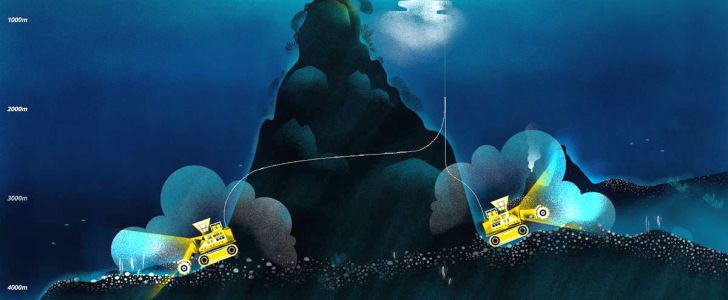The spring meeting of the International Seabed Authority (ISA) Council concludes in Jamaica on Friday (31).
The World Wide Fund for Nature (WWF) is pleased to see the growing number of countries calling for a moratorium or precautionary pause on deep-sea mining plans.
At the same time, WWF is concerned about continued pressure from other states and individual companies to begin deep-sea mining and the lack of neutrality on the part of the ISA Secretariat.

At the meeting, in addition to numerous non-governmental organizations, Chile, Costa Rica, Ecuador, the Federated States of Micronesia, Fiji, France, Germany, New Zealand, Palau, Panama, Samoa, and Spain.
And, for the first time, Vanuatu and Finland spoke in favor of a moratorium, precautionary pause, or ban on commercial deep-sea mining activities.
WWF welcomes this precautionary approach and the growing awareness of the immense risks of allowing deep-sea mining.
“Deep sea mining is an avoidable environmental disaster. We are painstakingly trying to contain the damage of resource extraction on land. Exploiting the still largely untouched deep-sea habitats must not be the next step.”
“We, therefore, need a moratorium on deep-sea mining until sufficient scientific evidence is available and it is proven that mining of mineral resources in the deep sea can be carried out without damaging the marine environment,” explains Tim Packeiser, a marine conservation expert at WWF Germany.
Under the United Nations Convention on the Law of the Sea, states must protect the marine environment.
However, considering the current state of knowledge, WWF does not see how this could be ensured in the event of the potential approval of large-scale raw material mining projects.
WWF is thus also very concerned to see that the Secretary General of the ISA is increasingly interfering in decision-making processes and taking a position.
During the meeting, Germany and Costa Rica, among others, also complained about this lack of neutrality by the ISA secretariat.
“The Secretary-General has to maintain his neutrality and not influence the deliberations in the Seabed Authority,” Tim Packeiser said.
The mood in Jamaica is tense after the Pacific island nation of Nauru triggered the so-called two-year rule in 2021.
This states that the ISA must review and, if necessary, approve an application for deep-sea mining after two years have elapsed, even if the set of rules governing the extraction of mineral resources (the so-called “Mining Code”) has not yet been finalized within that period.
This deadline expires in July.
Under corresponding time pressure, the 36 states represented in the Council of the International Seabed Authority are trying to finalize the negotiations on the code.
But even at the end of the spring meeting, numerous questions remain unresolved.
Parallel debates continue over how the Council should handle a potential application for mining resources when the Mining Code has not yet been agreed upon when an application is submitted.
WWF considers it a sign of hope that numerous states at the meeting expressed their support for not approving deep-sea mining applications even after two years, and the rules governing the extraction of mineral resources (the so-called “Mining Code”) have not yet been finalized within that period.
“States in the International Seabed Authority will decide the fate of the deep sea. In the face of the planetary crisis caused by climate change, biodiversity loss, and pollution, greed for raw materials must not be allowed to prevail over reason,” explains Tim Packeiser.
“The Agreement on the Protection of the High Seas, adopted to great acclaim in March, must not be undermined by unregulated deep-sea mining activities,” WWF calls on governments to continue to consistently advocate for the health of the world’s oceans in all relevant organizations and bodies.
“Only when all environmental, social, and economic risks are known, and all alternatives to deep-sea mineral exploitation have been exhausted, the need for deep-sea raw materials has been clearly demonstrated, and extensive measures to effectively protect the marine environment have been agreed upon, can deep-sea mining plans be considered.”
However, according to a WWF report, deep-sea minerals are unnecessary to transition to a fossil fuel-free economy.
“The Future is Circular” outlines ways to transition without opening the deep sea to mining.
Demand for the seven critical minerals studied could be reduced by 58% through technology, recycling, and circular economy.
The ISA continues negotiations in July.

